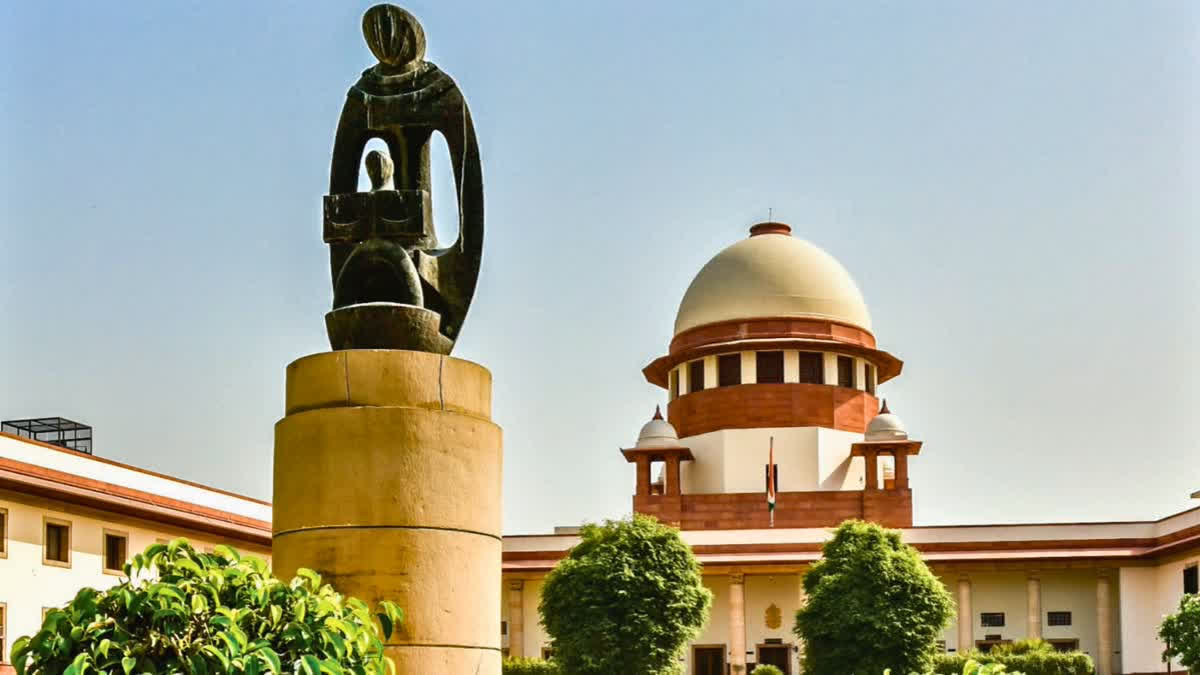New Delhi: The Supreme Court, on Wednesday, observed that if the government intends to create a level playing field for all political parties, then donations should be given to the Election Commission of India (ECI) which will distribute on an equitable basis after Centre contended that suppose if electoral bonds scheme were not to exist then kickbacks via cash would occur. The apex court also orally remarked that it is legalizing the kickback by giving money to the political party, as opposed to people who are involved.
A bench led by Chief Justice of India D Y Chandrachud and comprising justices Sanjiv Khanna, B R Gavai, J B Pardiwala, and Manoj Misra, is hearing a clutch of petitions challenging the validity of the Centre's electoral bonds scheme as a source of political funding.
Closing his arguments for the day, Solicitor General Tushar Mehta, representing the Centre, submitted suppose, the electoral bonds scheme is not in existence and an individual wants to give a kickback, then the kickback has to be by way of cash. The Chief Justice agreed with Mehta. Mehta, citing the worst scenario, said through the electoral bonds scheme the amount will come via the white money route and also into the official channel.
The Chief Justice orally remarked it is legalizing the kickback by giving money to the political party, as opposed to people who are involved.
Justice Khanna said the difficulty is if money is given through electoral bonds, then it is protected under the umbrella of confidentiality. Mehta said that is the heart and soul of the scheme and the incentive of the scheme.
The Chief Justice told Mehta, “We take your point that confidentiality is designed so that people are not victimized for contributing to a political party. We are not saying that it is the better scheme, that is not the point…..but if you want to have that scheme and a level playing field then all these donations should be given to ECI which will distribute on an equitable basis and you realize no donation will come."
Mehta said then nothing would come and everything would be by cash. The Chief Justice replied you are absolutely right.
During the hearing, Mehta referred to former Finance Minister Arun Jaitley’s 2017 Budget speech which introduced the electoral bonds scheme in the Parliament. Citing text from the speech, Mehta said an effort, therefore, is required to be made to cleanse the system of political funding in India and donors have also expressed reluctance in donating by cheque or other transparent methods as it would disclose their identity and entail adverse consequences.
Outlining the issue in dispute, the Chief Justice said the heart really is whether we accept this submission, that look if you require disclosure of identity, whether we like it or not, our political system is such that there would be a sense of vindictiveness: that you paid this to this political party.
Justice Khanna said there are two aspects: by giving greater confidentiality to the donor larger public interest is served and the second is selective confidentiality because the person in power can have access to it. Mehta said I will say he will not have.
Justice Khanna said, “That is the grey area and the other side will not agree to it, and their case will be coupled with the number of cases against the Opposition. You may be justified in saying there is a violation of the law, therefore cases are justified…..”.
The bench queried where is the statutory obligation on the State Bank of India to maintain confidentiality? Mehta said he will show there is confidentiality. Justice Khanna said the issue is if there is selective confidentiality then what happens and if confidentiality is given, how do we ensure what is called quid pro quo - how do we ensure that this is checked?’
Mehta paraphrased that "I have given money to get a favour and stressed that he has to remove the issue of selective confidentiality and establish there is complete confidentiality." Mehta said the government cannot find out whether my learned friend has given to A party or B, which he will show from the scheme but ultimately, “you have to trust somewhere”.
The Chief Justice orally remarked it is a hypothesis, a question, of legalizing kickbacks because as you rightly said in the earlier scheme, what would happen is a political party will collect some money through a rainmaker say for example Rs 50 crore and this amount would not be entirely deposited in the coffers of the political party and some of it would go to the rainmaker.
The Chief Justice added the benefit of this (electoral bonds scheme) is you are legalizing whatever is the motive of the funds but now it goes to the party it does not go to an individual that is the benefit, and the party gets it as opposed to the individual. “We have no way of knowing whether this is legalizing the motive for the inflow of the fund," noted the bench.
The bench got Mehta’s point that this is a political system whether you like it or not and this is how it is operated and we are now trying to at least improve upon it, and if we do not succeed it does not reach out to the constitutional validity of it, and maybe we have not improved upon the system and we tried to improve upon the system.
The bench also noted that the donor does not necessarily buy this bond, the person who buys the bond may not be the donor and the person who buys - their balance sheets will reflect the amount of bonds. The balance sheets of the purchaser will reflect, not the donor, it added.
The apex court will continue to hear the matter tomorrow.
Also read: ‘Electoral bonds scheme limited confidentiality can be lifted by judicial order’, Centre to SC



